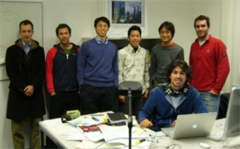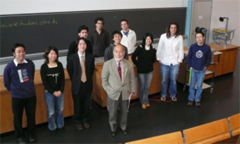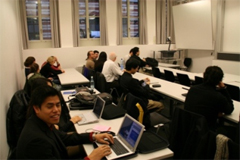 |
 |
|
|||||||||||||||||||||||||
|
| <<Back |
| International Exchange Program |
 
 ETH-UT Exchange Program 2005  ETH-UT Joint Workshop 2006  ETH-UT Joint Workshop 2007 We have been running ETH-UT Exchange Programs aiming at promotion of young researchers' cultivation through international research experience between other oversea bases since 2005. The purpose of this program is not only to offer opportunities to improve their communication skill in English but also to nurture able young researchers who can exert leadership by fully expressing themselves without hesitation. The program sent out five RAs and a project research assistant in 2005, four Research Assistants (RAs) in 2006 and three RAs in 2007. We ,too, have taken one professor and four young researchers (post doctorates) from ETH Zurich. RAs are sent to ETH Zurich for about two months (October and November) on this program. Those who wish to be appointed as a member of this program must contact one of the host professors in advance and submit their research proposals to obtain an preliminary acceptance of their stay. This process can help candidates improve their English skills and develop their planning ability, after which they must submit permission letters of their visit from their supervisors' in UT, the host professors' letters of consent to accept them and their written proposals of research activities during the time they are dispatched. Three to five RAs are finally selected after their papers and results of interviews in English. During the time they are dispatched, RAs must carry out reserach exchange/joint reserach according to their own research plans. Project management skills and leadership as well as fluency in English are required in the collaborative work with oversea researchers. They are also expected to obtain overall knowledge in engineering by developing and expanding their field of specialty taking such opportunities as a variety of research presentations, visit to companies and so on. In the final week of their two month stay, RAs must participate in joint workshop with young researchers in ETH to conclude their activities. After coming back to Japan, they must submit reports and present their achievements in the "Cross-Department Doctoral Course". We admit that two months is not long enough to expect extremely outstanding achievemnts in their research fileds. However, what we rather expect is that their experience will lead to further development in exchange among research groups and joint researches. Oversea study is normally programmed for six months to one year, which often makes it too difficult for potential candidates to consider application, because they also have to think about completing their doctorate theses, financial and security aspects and it may seem too much of a risk for them. Our short-term exchange program makes it possible for students to consider oversea research experience at a smaller risk. Also we arrange project teaching staff to stay with students in the first and the final weeks of the two months so that they can cope with their new life abroad. As winter term starts at the end of October in the Switzerland, not so many students will be found around for a while just after their arrival. However, there will be international conferences, workshops and seminars taking place in the premises around that time, so dispatched students can obtain broad knowledge in engineering by taking part in them. From November, students can experience the Western style lectures by taking lectures relevant to them. Circle reading which emphasizes on discussion, in addition to writing on boards, is found fresh by some RAs. In the final week, as a conclusion to what they have achieved in the research, students hold a joint workshop inviting young reserachers they have worked with and the host professors. Despite the short term, dispatched RAs each year come back with considerable achievements. It is not rare that such achievements lead to research collaboration between UTand ETH. Thus it seems fair to say this short-term oversea exchange program is an effective way of offering postgraduate students opportunities to acquire management skills and leadership which is difficult to foster in Japan. Development of collaboration at a faculty level preliminary promoted by such students' achievements is also a big benefit of this program. The most significant achievement of postgraduate students is an acquisition of confidence that they can work equally with oversea researchers and of stronger motivation for research activities, but not simply improvement in communication skill. We recognize such confidence and motivation in RAs' sparkling eyes when they come back home. |
| <<Back | Page top |